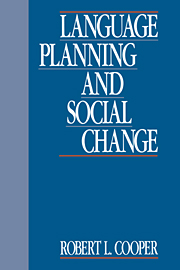Book contents
9 - Summary and conclusions
Published online by Cambridge University Press: 06 January 2010
Summary
After offering four defining examples of language planning and discussing various views of the field, I defined language planning as deliberate efforts to influence the behavior of others with respect to the acquisition, structure, or functional allocation of their language codes. I argued that descriptive frameworks can help us to formulate testable propositions about language planning, and I offered frameworks from four academic disciplines. Drawing upon those frameworks, I discussed in turn each of the three primary foci of language planning: status planning, corpus planning, and acquisition planning. Finally, I discussed language planning in terms of various theories of social change.
Based on this tour of language planning as a field of inquiry and as a practical endeavor, I offer the following generalizations:
Language planning is a widespread and long-standing practice. It is neither new nor confined principally to developing or underdeveloped countries.
Language planning cannot be understood apart from its social context or apart from the history which produced that context.
Language planning is typically motivated by efforts to secure or maintain interests, material or nonmaterial or both. There is nothing peculiar to language planning in this. In the struggle to promote interests one uses whatever ammunition is at hand.
Language planning may be initiated at any level of a social hierarchy, but it is unlikely to succeed unless it is embraced and promoted by elites or by counterelites.
[…]
- Type
- Chapter
- Information
- Language Planning and Social Change , pp. 183 - 185Publisher: Cambridge University PressPrint publication year: 1990



